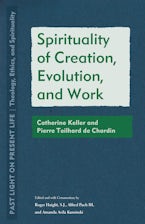- Home
- Ecology and Justice
- religion
- Living Cosmology

Living Cosmology
Christian Responses to Journey of the Universe
By: Mary Evelyn Tucker and John Grim
Series: Ecology and Justice
368 Pages
Living Cosmology: Christian Responses to ‘Journey of the Universe’ is a diverse and hopeful reflection on the work Thomas Berry and his call towards the “Great Work” for an ecologically sustainable future. Living Cosmology combines many of the great ecological thinkers within a comprehensive range of Christianity. It contains selections ranging from Pope Francis and Ecumenical Patriarch Bartholomew to process thought, from ecofeminism to ecopoetics, as well as including important topics such as race and class. The connecting thread through this volume is that each of the authors finds both hope for the Great Work and a call to particularity for their given location within Christianity.
The ecological crisis facing the world demands the largely silent North American Christian church to put into practice its beliefs of creation care. Mary Evelyn Tucker and John Grim, in the introduction, say, "if scientific cosmology gives us an understanding of the origins and unfolding of the universe, religious and philosophical reflection on scientific cosmology can provide a sense of our place and larger purpose in the universe" (4). This text provides the ecumenical resources to reimagine the place of the cosmos in Christian theology.
Considerable work has been done in the study of ecology and human impacts on the earth, and many Christian theologians have been writing and teaching on ecotheology, but this has gone largely unnoticed by the larger North American church. What Living Cosmology provides for us is a place to begin the process of reimagining future theologies and practices with the resources that Berry, Brian Thomas Swimme, Tucker, and Grim have been working on for quite some time. This book stands as a call to professors, pastors, and engaged laypersons to put theologies of ecology to work within the practices of the spiritual life of the church.
Beyond the need for Christians to work across theological borders, this text also reminds us that we need to work with those concerned about the ecological crisis that are outside of the Christian tradition. Catherine Keller urges us out of our comfort zone when she says, "I am here supposed to be speaking as a representative of Christianity, let me use that voice to declare: God doesn't care whether we believe in God—just that we do God. That we enact, that we actualize sacred community in its planetary convivencia" (113). Pastors, professors, and committed lay people need to, according to Keller, find ways of being a community with one another, across ideological lines, so that we have a future to look forward to enjoying together.
In the forward to the book, Swimme makes a similar point, drawing on the deep relationality of the universe. We need relationships to sustain the work set before us, and only through relationships can we provide a sustainable future for generations to come. I will leave you with his words: “A neutron, if traveling alone through the universe, will disintegrate entirely within fifteen minutes. But take that exact same neutron and bring it together with other neutrons and protons in a carbon nucleus and it will suddenly discover it has the power to endure for billions of years. Relationships open up possibilities for creativity that are absolutely unrealizable by solitary individuals” (xiv).
Jay D. O. Potter is a doctoral student in Religon-Process Studies at the Claremont School of Theology.
Jay D. O. PotterDate Of Review:February 3, 2017
Mary Evelyn Tucker and John Grim are codirectors of the Forum on Religion and Ecology at Yale. They were students of Thomas Berry and have devoted themselves to his legacy by editing his books and producing the Emmy-award-winning film, Journey of the Universe with Brian Swimme. They co-edited Thomas Berry: Selected Writings on the Earth Community.











